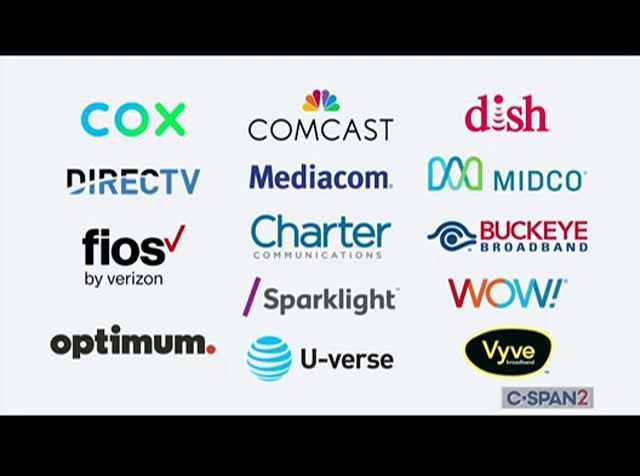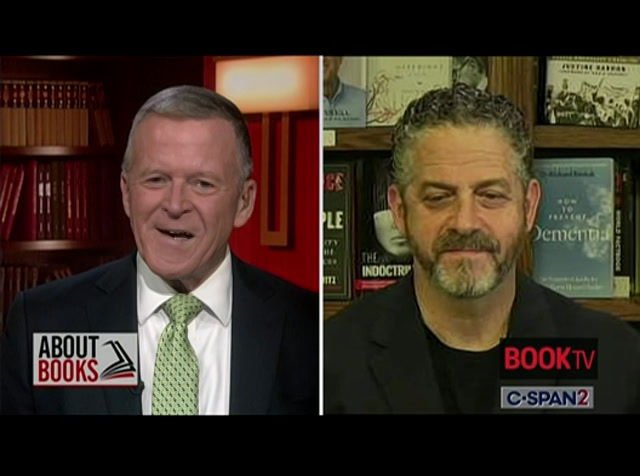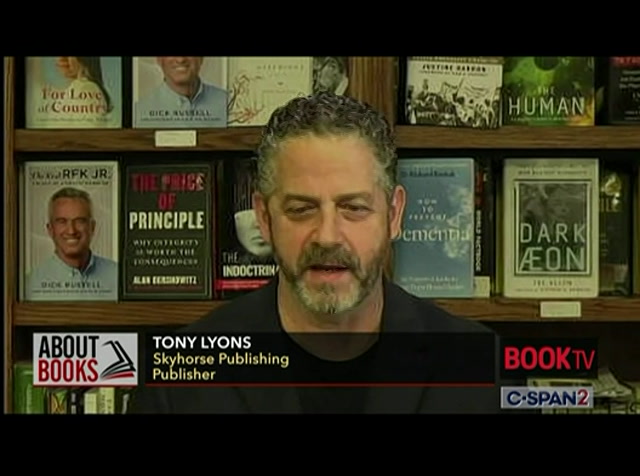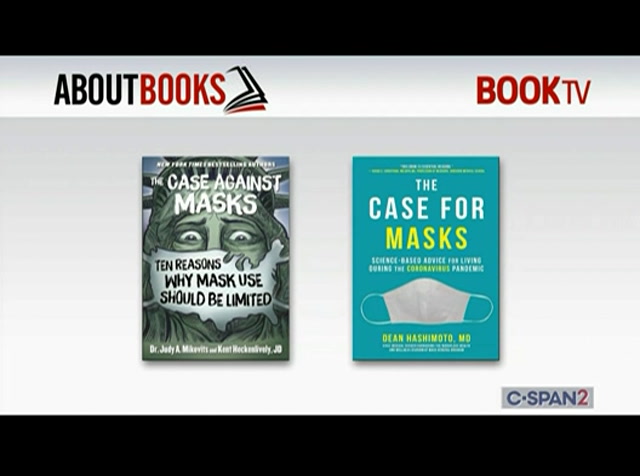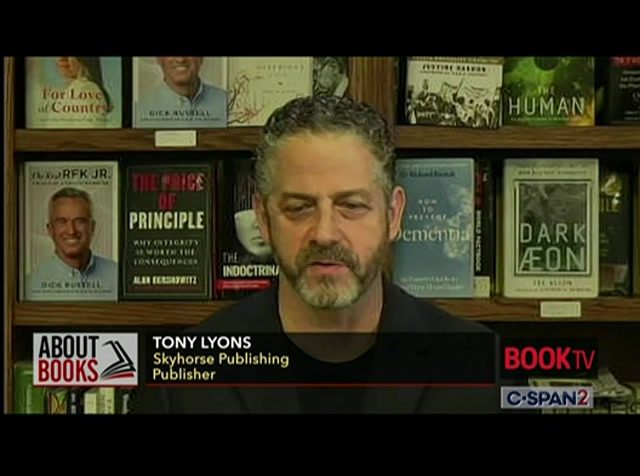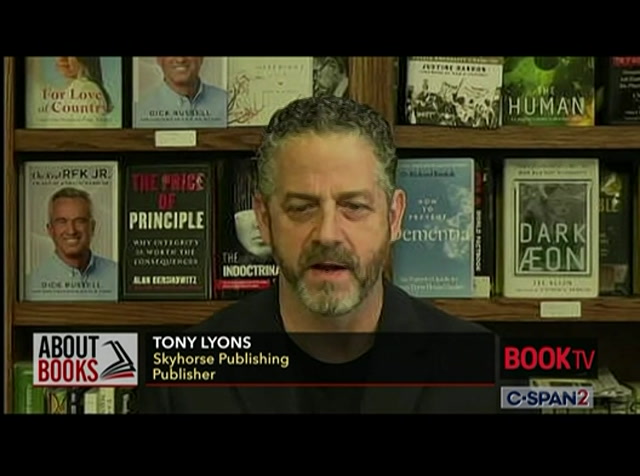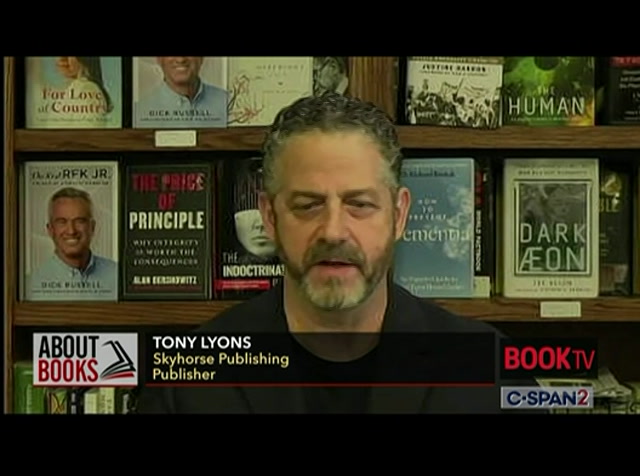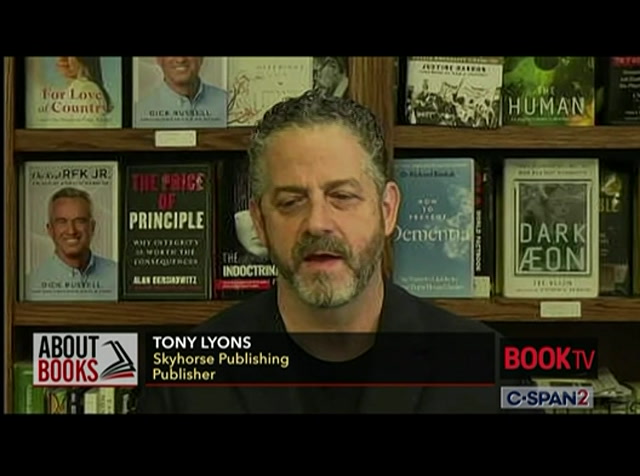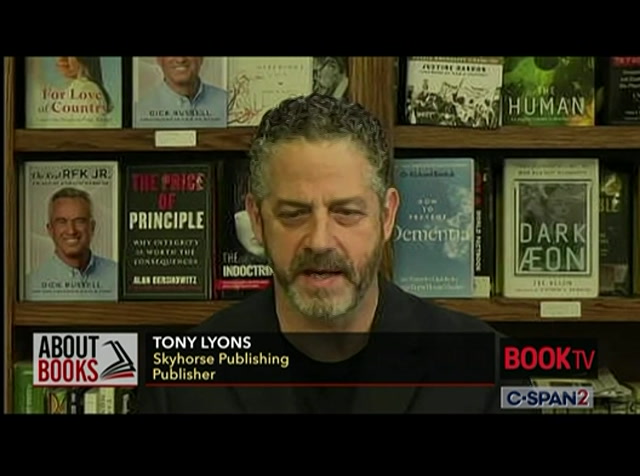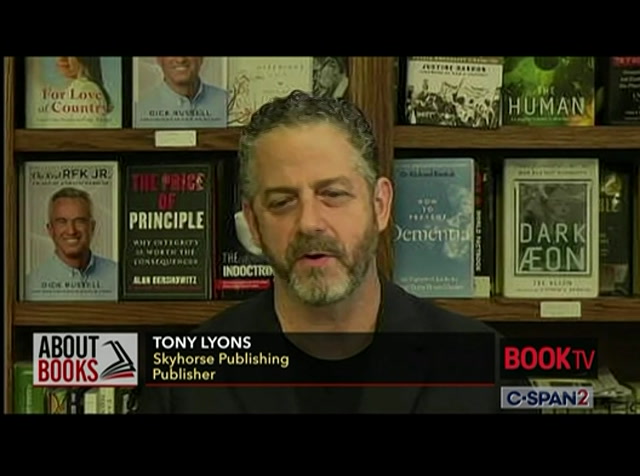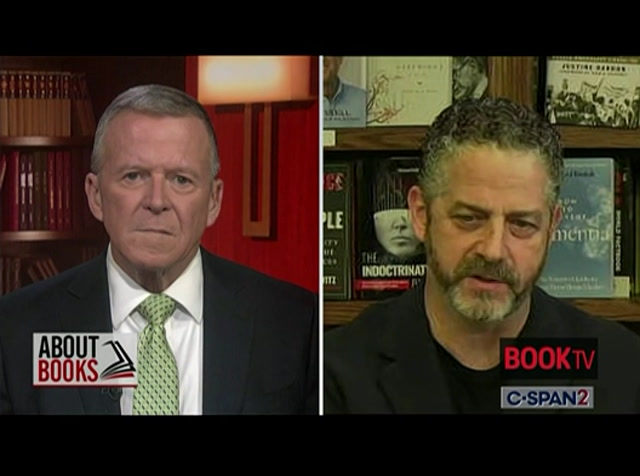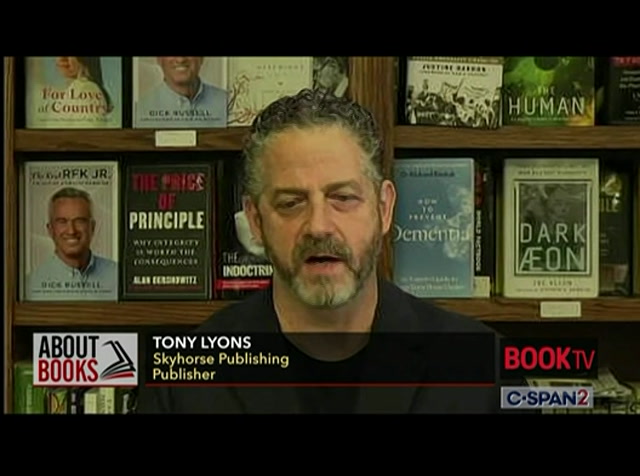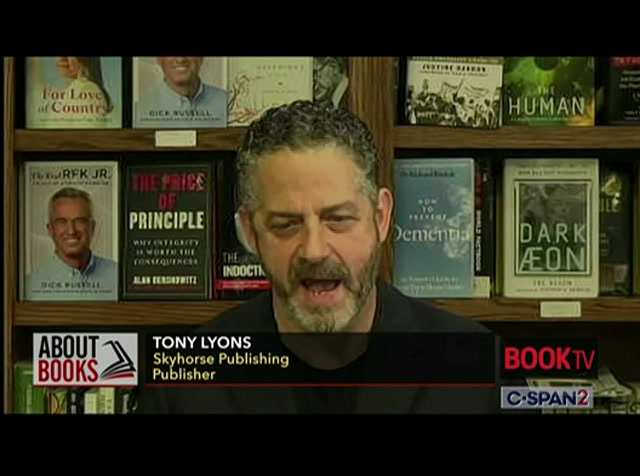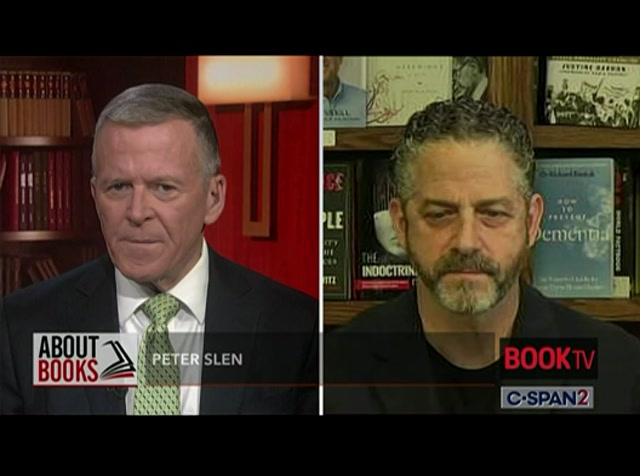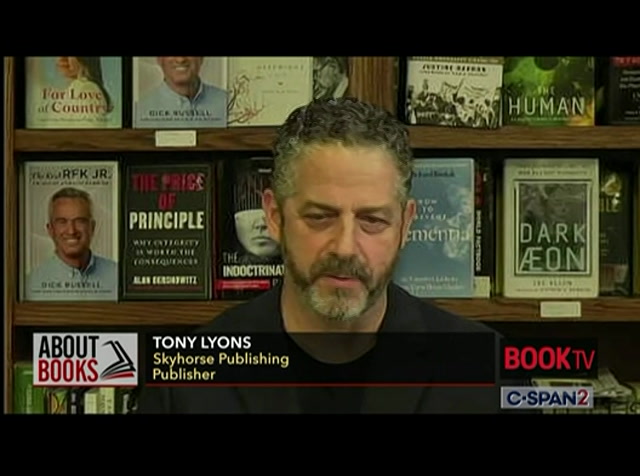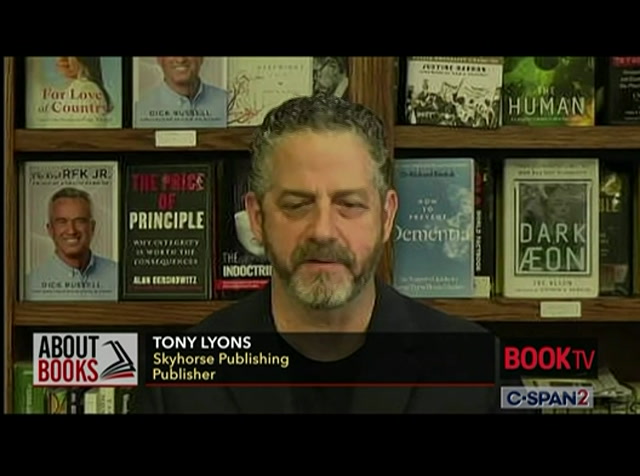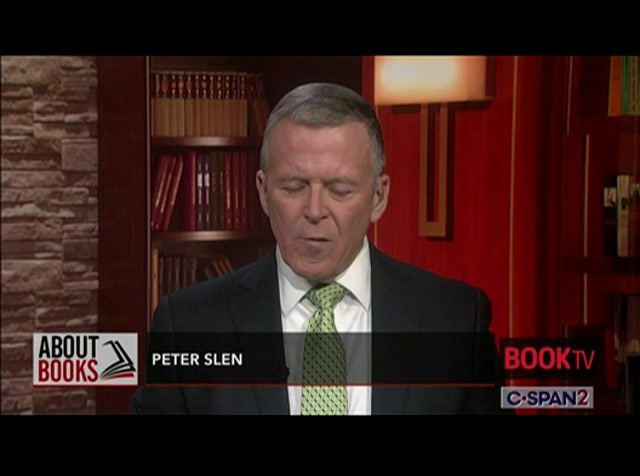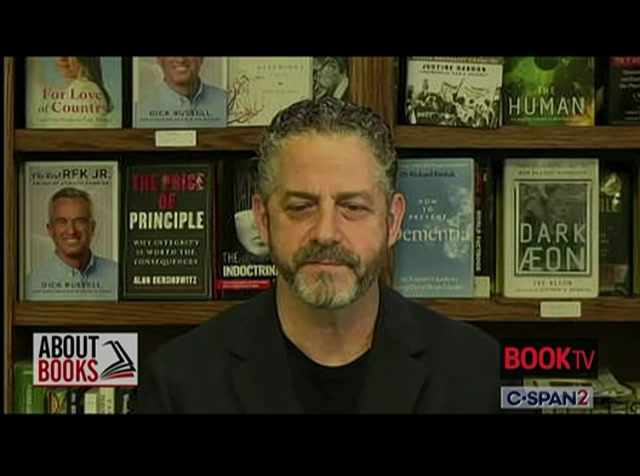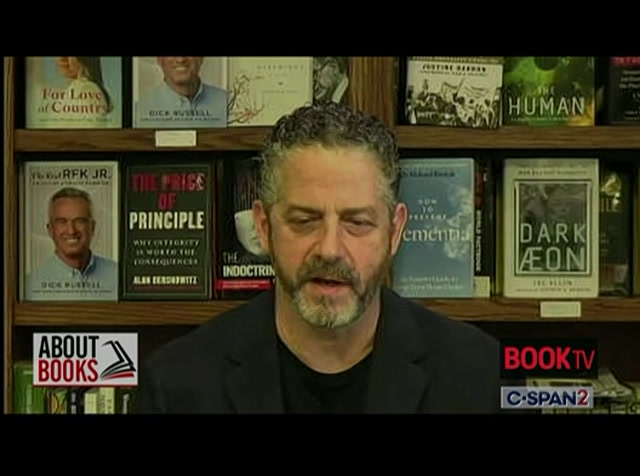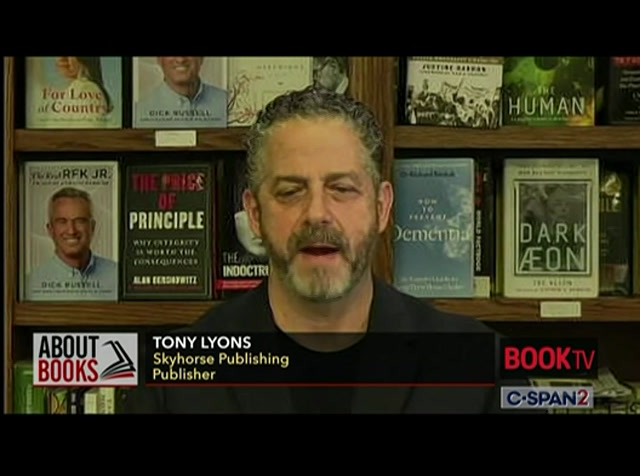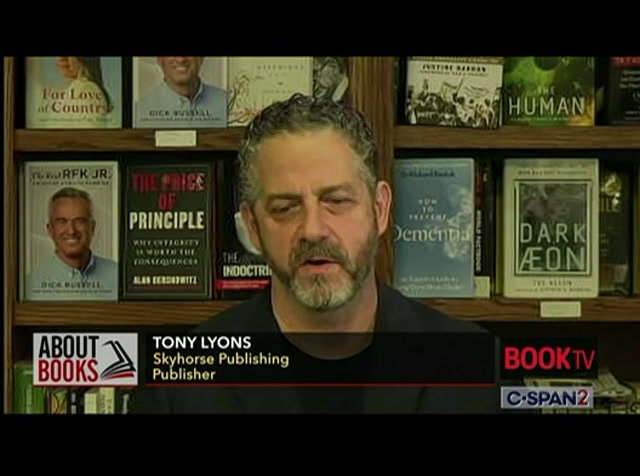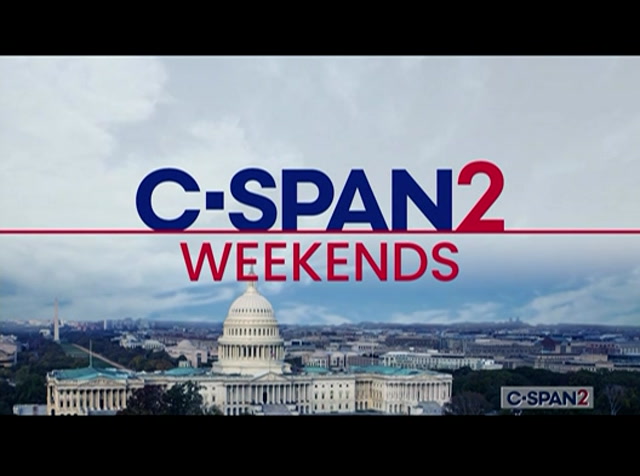tv About Books Tony Lyons of Skyhorse Publishing CSPAN March 28, 2024 4:18pm-4:41pm EDT
4:19 pm
latest news about the publishing industry with interesting insider interviews with publishing industry experts. we'll also give you updates on current nonfiction authors and books. the latest book reviews, and we'll talk about the current non-free open books featured on c-span's book publishing. so, toni lyons, tucker carlson described you as the last radical publisher in the united states. what do you think he meant by that? you know, i think that publishers to a great extent, have become sort of ways for people to just confirm their biases. so, you know, the big publishing companies don't want to, you know, published books that upset the people who work for them. they view publishing in a totally different way than i do. so i think that books should be disturbing. they should be dangerous. they should challenge people.
4:20 pm
that people should seek out books that are controversial shall, you know, that have a totally different point of view than the one that they're comfortable with. and i don't see the point in people reading books that just sort of confirm all their biases. you know, what's the what's the benefit to the reader there? you know, it's sort of maybe easy reading and they can read it while they're doing something else or you know, not you know, there's no need to take notes. there is no need to do any research. there's no need to think about it. so, you know, i think that that were at this terrible stage in american history, maybe in world history, where people are not interested in really thinking things through and in looking at opposing points of view. and i you know, i find that that's that's really a much bigger danger than the danger of, you know, any ideas. so i think that that there should be this vigorous
4:21 pm
marketplace of ideas where people disagree, where they, you know, people turn on the television and they hear both sides of all kinds of things. you know, we published a book in the fall of 2020 called the case against wearing masks. and at the same time, we published a book called the case for wearing masks. and both of them were sort of in-depth looks at, you know, what the arguments were. and so i amazon, some of the other big tech platforms took down the case against wearing masks because the government had decided that masks were good and that having anything on the marketplace, that challenge, that idea was dangerous. so they were able during that period to get all of the big tech platforms, to get amazon, google, youtube to facebook, instagram, to take down anything that they disagreed with and
4:22 pm
their, you know, their many cases now that are that are pending where it was clear that people from government agencies or people from the exactly of branch actually called up amazon or youtube or other places and told them to take material down and in a sense threatened them. i mean, they have so much power and the big tech companies were scared of, you know, antitrust lawsuit suits or, you know, other regulation. so they pretty much felt that they had to do it. and there's some letters back and forth saying, you know, how do you want this censorship to to go down? do you want us to just take the book off or take the information off? or should we amplify it? so those are the kinds of things that i think most americans have believed for for decades in in russia or china, but, you know, not in the united states that here we have access to
4:23 pm
information and we can decide things for ourselves. so, you know, skyhorse, you know, my goal with skyhorse is to sort of be the preeminent free speech publisher where people can find things that other publishers find are too dangerous to challenging and are afraid to publish. don't want the hassle of it. so, so i think that there's a real role there and that there are places like regnery that weren't doing well because in a sense they were just getting they were getting canceled in the marketplace. and tony lyons, you took that same pro and anti approach with elizabeth holtzman and alan dershowitz, the case for and the case against impeaching donald trump. right. and you know, so so i think that's a that's a really interesting way of publishing books and that, you know, i
4:24 pm
would like people to buy both of those books and and or to buy the one that they think that they really disagree with. and if their ideas can really stand up, then then they shouldn't be afraid. you know, so if somebody really believes something, why not read the opposite point of view? you know, why not say, where are my strongly held beliefs coming from? is it that i'm being indoctrinated? is it that i just, you know, grew up in a in a certain part of the country? so all the people here have that same point of view. i mean, i grew up in new york city. i'm sure that there are a lot of people in new york who have very similar points of view when it comes to politics or some specific issues. and then you go to alabama and you have people with very different points of view. so the narrative in new york is that the people in alabama are, you know, not as intelligent as the people in new york.
4:25 pm
and i'm sure that if you ask the people in alabama, they would think that the people in new york are just these crazy woke people who have these misguided views that that can't really stand up. so the idea is that, you know, any idea ought to be able to stand up to argument and, you know, that's what i would like to see much more of in this country. and then there's a there's a much more sinister side of it in that, you know, the big tech platforms, the internet started out as this incredible opportunity for just maximum, um, diversity that every kind of idea, you know, was there somewhere and if you were willing to do a little bit of research, you could find it. but then at some point, it kind of all went south. and what happened there is that people discovered that you can
4:26 pm
control the internet. so that the internet becomes the best possible source of censorship that the tools are so incredibly powerful. so while well, it started out as this opportunity or just this open world where everybody could have a voice, what it winds up being is that you can use bots, you can use specific types of censorship to make sure that it's very, very difficult to get opposing points of view. and when it comes to to politics, you can really stifle dissent if you just make sure that nothing that contradicts what your narrative is, you know, can be easily accessed. so that becomes true even with things like, let's say, the iraq war, where we all saw the beginnings of that. so people who said that there weren't weapons of mass destruction, you know, were
4:27 pm
censored, were vilified in some cases, lost their their government jobs. there was a cia agent outed as as punishment for it. so that was the beginning of it. and then you saw things like, you know, the the snowden story where there was a war on whistleblowers. but what it's come down to and it really happened during covid, is that anybody who disagreed then just kind of disappeared from the internet. so there were people who who had, you know, decades of building up their online presence, maybe not decades, maybe ten, 15 years, who if the government or if a big tech platform decided that something they were saying constituted misinformation and they could have their whole life's work just disappear, just taken down with no real recourse, no real way to kind of sue the government or sue youtube or sue
4:28 pm
google. and that, i thought was just such an incredible turnaround in america, in history and so sad to see. but what it what it winds up being and what it what it really can get to is that any kind of dissent can be labeled as misinformation. so when you looked at at the definition of health, misinformation during covid, it actually became and was described in many places as anything that contradicts the official government point of view. so you would have won official say something and anybody who contradicted that official then was scrubbed from the internet. so the problem is that once you give the government that kind of power, it's not easy to take it back. and, you know, so you can say, well, we're in a crisis.
4:29 pm
so we have to do take certain steps to to protect people, even if there are many people who would then say, well, you didn't actually protect people you protected people making certain products, corporate nations making certain products. but but but that's a long story that doesn't really fit here. but the idea is that you can then take any narrative about any subject and say that it's the truth. and because it's the truth, anything that contradicts it shouldn't be allowed to be published either in book form or in or in any other form. and that, i think, is sort of fundamentally un-american. so i really want to combat that. and i'm working very hard to do that. and and i think, you know, that a company like regnery that has this really story history of publishing conservative views for, you know, 75 years, then sort of found itself not well
4:30 pm
represented in any independent bookstores for example, many books that that they publish. i mean, i didn't really know the details, but i could see from the books that i was publishing. so when i published robert f kennedy's book, the real anthony fauci, you know, it was the bestselling book in america. in its first week, it sold 93,000 copies. the new york times bestseller list made it number seven. they wouldn't accept an ad for it. big tech platforms wouldn't take ads for it. so it was censored in every possible way. it got no reviews at all. total media blackout because it was labeled as misinformation, which by the definition that was prevalent then, which was anything that contradict did statements by dr. fauci were pese misinformation. he represented science. and that was that was where
4:31 pm
where, you know, the government position had had gotten to. so a book that contradicted him even just by the title. so you didn't have to read any of it to decide that. and the title itself was misinformation because it said that a government official might be saying things that were untrue or incomplete or needed further research. tony lyons, is it fair to say that you published conservative books? i know you just bought regnery and another conservative publisher as well. yeah. so, you know, we we publish books across the political spectrum. we have many books coming out this this year that are, you know, really solidly can conservative books. we have pro-trump books, but we also have anti-trump books coming out. we have books that are for bobby kennedy. so, you know, it's really across the political spectrum with all the different nuances. and that's the kind of publisher
4:32 pm
that i that i want to be. so when it comes to conservative books, i've been really fascinated by the censorship of those books. so that kind of drew me more towards that kind of publishing and on the, you know, on the democratic side, if, if you have a really well-respected democrat writing a mainstream book right now, you have five, you know, gigantic publishing companies, five companies that, you know, are more than $1,000,000,000 companies that are going to get a bid on those books. but if you have a really great, you know, exciting, interesting, challenging conservative book, there are not many publishers who would be brave enough to publish them now. so that's a it's a very strange historical moment. there. and so i wanted to take part in
4:33 pm
kind of writing what i see as a as a wrong. you've published woody allen, rfk jr, as you said. alex jones. so is there anything off limits? you know? that's always a tough question. and, you know, if if a book explores that point of view and, you know, that's a and it's a strong argument for whatever the point of view is, i think it's better for the world to have it out there. and i think that that what you find is, you know, when you look at this country now, there really two americas with two totally different narratives of what the truth is. and, you know, i think that that's really, really harmful, really dangerous, but also bad for the american mind that that we really want the broadest possible spectrum of ideas. and and and the idea that that
4:34 pm
both sides have, that there's all this missing formation and that that ought to be taken down, you know, really, the truth is decided, like i said before, in the marketplace of ideas and that it's much better to have it done in the town square with people making their very best arguments rather than a publisher or or a government or a big tech company deciding for us what the truth is. some of the other authors published by skyhorse include ted cruz, paul manafort, chris hedges and julian lennon. what where did the name skyhorse come from? the name skyhorse came from an employee who worked at the company many, many years ago. i really liked the name. it doesn't really have much to do with the person that it that it came from, but i had started off thinking that i was going to going to call it pegasus books.
4:35 pm
and what i what i liked was the idea of something sort of soaring into the clouds, you know, something big some some big idea, some new way of publishing. and but at the time that that trademark was taken, you know, there's there's another publisher called pegasus books. so skyhorse seemed like a like a good alternative to that. and it's a name that i that i really like now, you know, totally separately from the from the history of where the idea of it came from. well, tony lyons, you started with lions press. does that still exist? yes. so my father started lions press in 1985. he was a professor of literature in new york. he he wrote, i believe, 26 books and literally thousands of articles and newspapers and magazines. he still alive. he's 91 years old, an incredible man. and so he founded lions press and hired me. i had gone to law school,
4:36 pm
practiced law for about 18 months, and then joined his publishing company. and i helped him run that up until 2001. and then we sold the company and i went with them and and then ran it for the company that bought us for three years. and they are they are still still publishing books. yes. well, you keep the regnery imprint two or fold that into skyhorse. definitely keep the regnery imprint. i think it's a great brand and i and i'd like to, you know, be a good steward of the brands that that we take on. what about i would you publish a book written in a. yeah. i mean my my feelings there are that you know, it's a very complicated area. and i think that that as a free speech publisher that i should
4:37 pm
be open to all the different historical changes. so, you know, i'm a little bit skeptical of, you know, sort of how it's going to all play out and with certain kinds of books, it it seems like it's it's it's not going to play out. well. but but but in theory, you know, if it was, for example, somebody was going to write a practical book and it was somebody who was an expert in that area and they had written many, many articles and i then became away for them to sort of shortcut the whole process and say, write a book in my own voice based on my own articles on how to do some specific thing, you know. so to the extent that it would just save them. 500 hours work and then create an author tick book, that was
4:38 pm
their idea based on, you know, their form of, of, of writing, their style, their ideas, you know, that that, i think isn't a bad thing. and that, you know, any time we can find ways historically to do things more quickly and get a product that's, you know, just as high quality, that's fine. you know, i you know, i think that there are a lot of dangers to it, too. and that word, you know, we're starting to to see what some of those are, that there's all kinds of bias that can go into the process of of a i. but but i'm but i'm open to anything. tony lyons founded skyhorse in 2000 657 new york times best seller. so far more than 10,000 books on the backlist the wall street journal says about him, quote, mr. lyons doesn't use sensitivity readers and that alone qualifies him as a maverick in today's environment. but he's really an old fashioned civil libertarian and wary of
4:39 pm
power in all its forms. he especially deplores the extent to which social media platforms or traditional media and government seem to have joined hands to combat misinformation. he sees such coercive unity as antithetical to the healthy clash of viewpoints necessary for discovering truth. tony lyons is the publisher of skyhorse. we appreciate your spending a
4:40 pm
7 Views
IN COLLECTIONS
CSPAN2 Television Archive
Television Archive  Television Archive News Search Service
Television Archive News Search Service 
Uploaded by TV Archive on

 Live Music Archive
Live Music Archive Librivox Free Audio
Librivox Free Audio Metropolitan Museum
Metropolitan Museum Cleveland Museum of Art
Cleveland Museum of Art Internet Arcade
Internet Arcade Console Living Room
Console Living Room Books to Borrow
Books to Borrow Open Library
Open Library TV News
TV News Understanding 9/11
Understanding 9/11